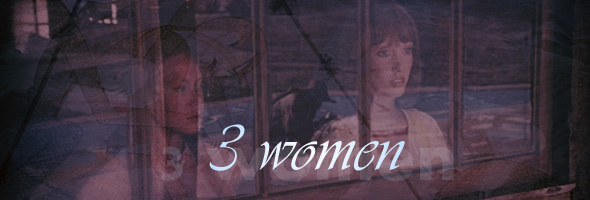
Color, 1977, 124m.
Directed by Robert Altman
Starring Sissy Spacek, Shelley Duvall, Janice Rule, Robert Fortier, Ruth Nelson
Arrow (Blu-ray) (UK RB HD), Criterion (Blu-ray & DVD) (US RA/R1 HD/NTSC) / WS (2.35:1) (16:9)

Color, 1977, 124m.
Directed by Robert Altman
Starring Sissy Spacek, Shelley Duvall, Janice Rule, Robert Fortier, Ruth Nelson
Arrow (Blu-ray) (UK RB HD), Criterion (Blu-ray & DVD) (US RA/R1 HD/NTSC) / WS (2.35:1) (16:9)
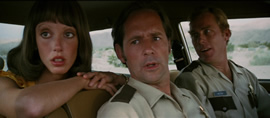
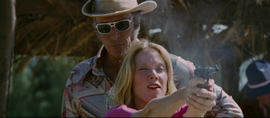 Though it seems Woody Allen had the market cornered on riffing on Ingmar Bergman in the 1970s, he was far from the only one attempting it. The influence of the Swedish maestro unmistakably turned up in Robert Altman's underrated 1972 metaphysical thriller Images, basically a gender-swapped version of Hour of the Wolf, but Altman's greatest and most tantalizing riff on Bergman was yet to come with 3 Women in 1977, which transforms the techniques and themes of Persona into something remarkably different. Thanks to a confused marketing campaign by Fox and a rapidly turning tide against edgy New Hollywood fare, the film (which won prestigious acting awards at multiple festivals) underperformed with the general public upon its release but garnered more than a few admirers. It became maddeningly difficult to see for decades afterwards, and its much-delayed debut on home video in 2004(!) finally confirmed its status as a major work in the director's canon.
Though it seems Woody Allen had the market cornered on riffing on Ingmar Bergman in the 1970s, he was far from the only one attempting it. The influence of the Swedish maestro unmistakably turned up in Robert Altman's underrated 1972 metaphysical thriller Images, basically a gender-swapped version of Hour of the Wolf, but Altman's greatest and most tantalizing riff on Bergman was yet to come with 3 Women in 1977, which transforms the techniques and themes of Persona into something remarkably different. Thanks to a confused marketing campaign by Fox and a rapidly turning tide against edgy New Hollywood fare, the film (which won prestigious acting awards at multiple festivals) underperformed with the general public upon its release but garnered more than a few admirers. It became maddeningly difficult to see for decades afterwards, and its much-delayed debut on home video in 2004(!) finally confirmed its status as a major work in the director's canon.
At a desert health spa for the elderly in California, the young and awkward Pinky (Spacek) starts to develop a codependent bond with her much more extroverted coworker, Millie (Duvall). The two eventually become roommates and strike up a rapport with the nearby Willie (Rule), a pregnant woman who creates surreal mythological murals, and her cop bar owner husband, Edgar (Fortier), and after Pinky suffers a concussion and temporary coma after a disruptive incident at home, she and Millie start to transfer elements of each other's personalities. Then Willie becomes a more important part of their lives as well, leading to an enigmatic and haunting third act that viewers are still trying to interpret.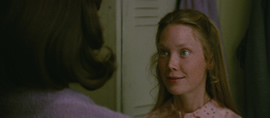
Though it never quite tips over all the way, 3 Women  feels like a low-key psychological horror film for a large portion of its running time with Pinky's absorption of Millie's identity, denial of her past identity, and seemingly pathological behavior in private making her a more spiky evolution of her famous prior roles in Badlands, Prime Cut, and Carrie. In her sixth and penultimate role for Altman, the always likable and offbeat Duvall matches and even outdoes her every step of the way, and both of them feel like authentic denizens of this strange desert environment that feels like it exists somewhere outside of time and space altogether. The film also marks one of Altman's most notable visual achievements, as he had long switched over to shooting in scope ever since 1970's M*A*S*H and would use the wide compositions to capture a loose, expansive atmosphere perfected in earlier titles like Nashville and The Long Goodbye. Interestingly, he would mostly abandon 2.35:1 once he hit his streak of theatrical-inspired films in the 1980s, forging a very different visual dynamic that would mark another chapter in his unorthodox but astonishing career.
feels like a low-key psychological horror film for a large portion of its running time with Pinky's absorption of Millie's identity, denial of her past identity, and seemingly pathological behavior in private making her a more spiky evolution of her famous prior roles in Badlands, Prime Cut, and Carrie. In her sixth and penultimate role for Altman, the always likable and offbeat Duvall matches and even outdoes her every step of the way, and both of them feel like authentic denizens of this strange desert environment that feels like it exists somewhere outside of time and space altogether. The film also marks one of Altman's most notable visual achievements, as he had long switched over to shooting in scope ever since 1970's M*A*S*H and would use the wide compositions to capture a loose, expansive atmosphere perfected in earlier titles like Nashville and The Long Goodbye. Interestingly, he would mostly abandon 2.35:1 once he hit his streak of theatrical-inspired films in the 1980s, forging a very different visual dynamic that would mark another chapter in his unorthodox but astonishing career.
In the video debut of 3 Women on DVD from Criterion in 2004, Altman went on record about the fact that it was inspired by a dream he had and still held a few mysteries he hadn't completely unpacked. A longtime champion of the film, Roger Ebert among other people was startled by some of Altman's readings of the film (including his interpretation of that last shot, which takes on a far more macabre tone once you've heard the commentary track), and it's a recommended lesson for anyone left wanting more after a viewing of the film. That disc also includes the theatrical and teaser trailer, two TV sports, a stills gallery, and liner notes 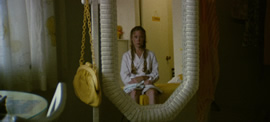 by critic David Sterrit. In 2011, the same package was ported over for a Blu-ray release with the same extras and a featuring an impressive, pleasing HD transfer from an interpositive.
by critic David Sterrit. In 2011, the same package was ported over for a Blu-ray release with the same extras and a featuring an impressive, pleasing HD transfer from an interpositive.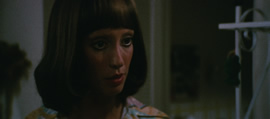
Four years later, Arrow Films debuted the film on UK home video with a Blu-ray edition sporting a completely different set of extras apart from the theatrical trailer. Here we have a six-minute Duvall interview from her acting award acceptance at Cannes in 1977, a 37-minute video interview with Altman expert David Thompson about the film's genesis and placement in the director's challenging string of "art" fare that temporarily waylaid his commercial reputation, and a trio of galleries from the film's production, Cannes rollout, and marketing campaigns, plus a liner notes booklet with an essay by David Jenkins and excerpts from Thompson's Altman on Altman. The transfer itself is the big point of discussion here as it's touted as a new 4K restoration by Fox; it looks tighter with a more acutely resolved grain structure with a bit more information on the left and right sides (as well as a less horizontal compression), though more controversially, the color scheme looks different compared to the Criterion; some scenes are warmer with a heavier emphasis on yellow, while others have a brighter, hotter appearance with different saturation levels. For example, here's a shot of the second frame grab above from the Criterion release; the ones seen embedded here are from the Arrow. Fans should still be very pleased with the viewing experience (which is atmospheric and oddly effective given the setting of the film), but it's fascinating to compare the two presentations and weigh their respective strengths and weaknesses. The LPCM mono audio sounds excellent, with optional English subtitles also offered.
![]()